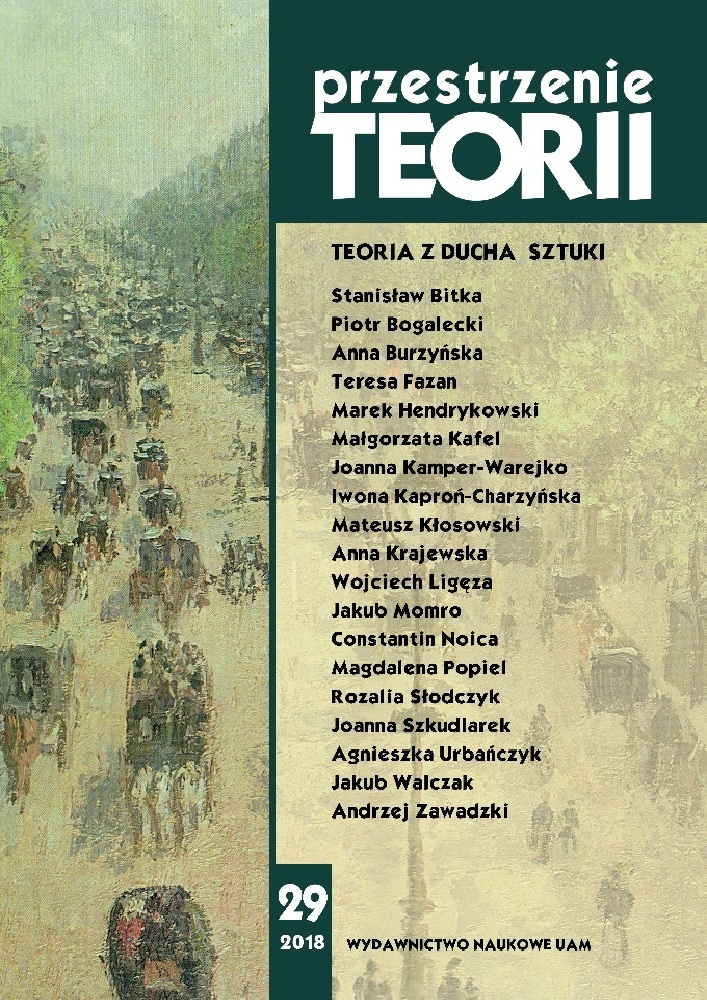Abstract
The article is an attempt at analysing the role of the references to jazz music in the Argentinian writer’s most famous novel, which chapters 10–18 provide an interesting example of the use of this kind of music as a means of a whole range of extraliterary meanings. In the article Hopscotch is treated both as a Cortázar’s artistic manifesto and as an example of a work which fulfils its assumptions in the most complete manner. Musical elements such as improvisation and swing shape the novel in its various aspects, from narration to structure, reflecting a surrealism-inspired need to create literature that transcends traditional ontological frameworks. Jazz is also an illustration of aspirations to independence in artistic and social fields, as well as a means of conveying philosophical ideas and reaching the subconscious.
References
Berendt J.E., Wszystko o jazzie. Od Nowego Orleanu do jazz-rocka, tłum. S. Haraschin, I. Panek, Kraków 1991.
Chądzyńska Z., Posłowie, [w:] J. Cortázar, Gra w klasy, tłum. Z. Chądzyńska, Kraków 2004.
Chądzyńska Z., W rocznicę śmierci, „Literatura na Świecie” 1985, nr 2 (163).
Cortázar J., Gra w klasy, tłum. Z. Chądzyńska, Kraków 2004.
Cortázar J., O literaturze. Wykłady w Berkeley, 1980, tłum. I. Krupecka, Gdańsk 2016.
Cortázar J., Ostatnia runda, tłum. Z. Chądzyńska, Warszawa 2000.
Deeds Ermarth E., Sequel to History: Postmodernism and the Crisis of Representational Time, Princeton 1992.
Eco U., Dzieło otwarte. Forma i nieokreśloność w poetykach współczesnych, tłum. L. Eustachiewicz, J. Gałuszka, A. Kreisberg, M. Oleksiuk, Warszawa 2008.
Eco U., Zen i Zachód, tłum. Gałuszka J. [w:] U. Eco, Dzieło otwarte. Forma i nieokreśloność w poetykach współczesnych, tłum. L. Eustachiewicz, J. Gałuszka, A. Kreisberg, M. Oleksiuk, Warszawa 2008.
Głowiński M., Gry powieściowe. Szkice z teorii i historii form narracyjnych, Warszawa 1973.
Głowiński M., Muzyka w powieści, [w:] Muzyka w literaturze. Antologia polskich studiów powojennych, red. A. Hejmej, Kraków 2002.
Goialde Palacios P., Palabras con „swing”. La música de jazz en la obra de Julio Cortázar, “Musiker: cuadernos de música” 2010, 17, s. 483–496.
Guczalski K., Znaczenie muzyki – znaczenia w muzyce: próba ogólnej teorii na tle estetyki Susanne Langer, Kraków 2002.
Hejmej A., Muzyka w literaturze: perspektywy współczesnych badań, „Teksty Drugie” 2000, nr 4.
Kolankiewicz L., Wstęp. Carl Gustav Jung – wędrowiec Wschodu, [w:] C.G. Jung, Podróż na Wschód, wybór, opracowanie i wstęp L. Kolankiewicz, Warszawa 1989.
Markiewicz H., Teorie powieści za granicą, Warszawa 1995.
Peyrats Lasuén P., Jazzuela. El jazz en Rayuela, la novela de Julio Cortázar, Barcelona 2014.
License
Authors
Authors of texts accepted for publication in Przestrzenie Teorii are required to complete, sign and return to the editor's office the Agreement for granting a royalty-free license to works with a commitment to grant a CC sub-license.
Under the agreement, the authors of texts published in Przestrzenie Teorii grant the Adam Mickiewicz University in Poznań a non-exclusive, royalty-free license and authorize the use of Attribution-NonCommercial-NoDerivatives 4.0 International (CC BY-NC-ND 4.0) Creative Commons sub-license.
The authors retain the right to continue the free disposal of the work.
Users
Interested Internet users are entitled to use works published in Przestrzenie Teorii since 2015, for non-commercial purposes only, under the following conditions:
- attribution - obligation to provide, together with the distributed work, information about the authorship, title, source (link to the original work, DOI) and the license itself.
- no derivatives - the work must be preserved in its original form, without the author's consent it is not possible to distribute the modified work, such as translations, publications, etc.
Copyrights are reserved for all texts published before 2015.
Miscellaneous
Adam Mickiewicz University in Poznań retains the right to magazines as a whole (layout, graphic form, title, cover design, logo etc.).
